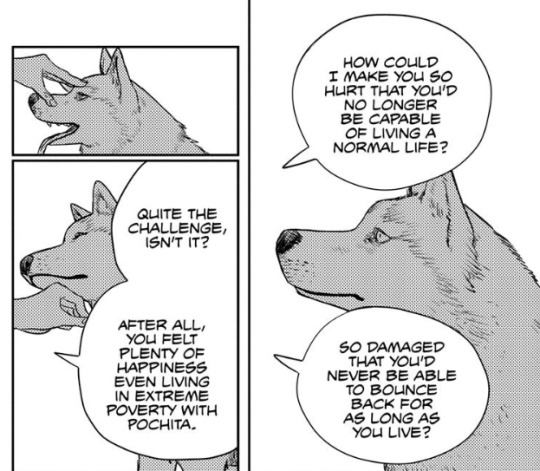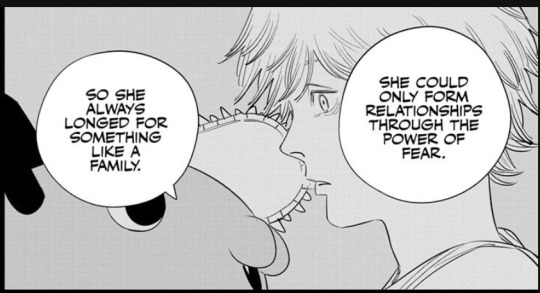#this is because i'm so writingpilled metacelled at all times. literally.
Explore tagged Tumblr posts
Note
hi i'm the op of that post (stackslip) PLEASE elaborate on chainsaw man's metanarrative
hi! um. you've given me free reign, i hope you know what you're doing. anyway: fair warning in advance that this is based entirely on how i like to interpret and think of the csm story and doesn't necessarily hold true, partly because of the level of abstraction that i'm operating at here. i'm normal and i like metanarratives a normal amount. this might be a little long. but.
um. thinking about how protagonism in CSM is inflicted on denji by the author insert that is makima. i've brought up the Icon of chainsaw man before in my part 2 analyses but basically:
the Chainsaw Man is the role that denji occupies in the story, right? it's the title of the manga. it's what the public Sees him as. it's what makima quite literally produces. the relationship between denji and the chainsaw man in both aspiration and idealisation forms a major stem of both part 1 and part 2's narrative.
this production occurs on two levels: (1) what Chainsaw Man is, and should be, and (2) how denji is developed as a protagonist by makima.


"you don't get him at all." chainsaw man is her blorbie (i think i'm funny). the point is that the Presentation of chainsaw man, the one that the audience is initially set up to expect, is almost entirely synonymous with makima's version of the CSM that we get later. i think a lot about how part one borrows from, amplifies, and later subverts shounen tropes. the CSM as an idea persists in how it's discordant from denji's normality in part 2 but part 1's direction in how denji voluntarily inhabits the chainsaw is what i'm pointing at here. (there's a lot to be said about how denji's idealisation as tied to the icon of the CSM is intertwined with his wants but that's not relevant in this meta except in the minutiae of his adherence / resistance to this role.)
the thing is that makima is instrumental in pushing this role onto denji. she sees chainsaw man, he is chainsaw man. it's (and i sound insane here but please hold on, i beg) like writing.
i think her addressing him in the last battle scene, the "i'll kill you personally" is indicative of her finally divorcing denji from the chainsaw; forming The Chainsaw Man in full, while still obviously curating the denji that would support this formation throughout the story.
a small side here but: "but she never even saw me once, even from the start." // fujimoto's writing actively utilises characters towards the end goal of shaping the protagonist. this struggle here is one between a character and an author.


now continuing; the way that makima provides for and then systematically removes these initial connections simulates traditional story structures with its setup, its confrontation and resolution. her excellence as an antagonist rests upon her identity as a narrative device which develops the protagonist and pushes him through this structure. the conflicts and the loss that a protagonist usually naturally (at least in-world) goes through in a story are instead all artificially created by makima.
"how could i make you so hurt that you'd no longer be capable of living a normal life?" // her molding of denji isn't just passive emotional manipulation, it's active writing. she herself is aware of the tropes and the character relationships that are being built up, that are being subverted. she herself embodies, espouses and resolves the themes of multiple arcs (thinking of the end of the bomb devil and the darkness devil arc here / thinking of how she draws the shutters on ignorance and on wanting).
there's a lot i try to extrapolate from her commentary on movies during her date with denji especially in context with the story simulation that she herself is doing throughout the manga. i find it interesting how the ending to the movie date or the "good" movie founds itself on shared feeling: denji sees makima cry at the same movie as he does.

"the drinks yesterday were delicious." // you talked about her goals already in your post but makima's search for real intimacy (and equality in a relationship) coincides with denji's one. to me, it comes off as a writer trying to find a mirror of understanding in their own creation. the way she visualises the CSM (as "chaos" to her order) reveals a relationship quite like the flawed connection that one has with characters one makes: and this relationship is what denji (the 'stage' of this process) responds to so emphatically: "she wasn't looking at me this whoole time."
so, yeah; CSM to me operates at two levels: the one with the deeply human character relationships that construct the story and another layer where fiction and ideation mesh. it's important to note that this is something fjmt quite likes doing in his other work: using characters to specifically engage with the telling of his stories or exploring his characters' nuanced reactions to fiction and its weight.
thinking of makima as the 'Author' is misleading, though, and it ignores the fact that makima is both a device deployed by the actual author and in-world by the structure that are the higher ups. she is the control devil; she controls the scaffoldings of the story but she in herself is an agent of the author, of the narrative, of the aforementioned higher ups.
i don't know. is an artist ever truly original in their art? do they not operate within a greater structure, borrowing from and being regulated by it and its interpretation of their work? are makima's plans not ultimately upset by her creation?
denji materialises as a character from multiple active sources instead of the unitary source that makima believes herself to be. he's a passive character and yet he refuses to be a stable creation (psst. it's that universal tussle between the living art and the artist -- something fjmt's already tackled in his oneshots).
i don't know (2). this interpretation's been simmering in my head for a while, but i wasn't very Sure about it. but hm. this writeup primarily bases itself off part one (since it's well. complete) but image and image production specifically coming into fruition as a theme in part two makes me feel increasingly confident in this interpretation. it's strange how it somehow all ties back into storytelling.
#this is because i'm so writingpilled metacelled at all times. literally.#like. i'm obsessed w reze as of now but that Thing that was makiden throughout the manga. actually still has me in a chokehold.#taps makima and denji -- these two can fit so many Themes into them.#and even part 2's grappling with structure#and how devils are written also as roles and through their interpretations. so so tasty#chainsaw man#csm meta#chainsaw man meta#makima#denji#crow.txt#crow.asks#stackslip#<- is it OK if i tag this? thank you so so much for the ask
83 notes
·
View notes